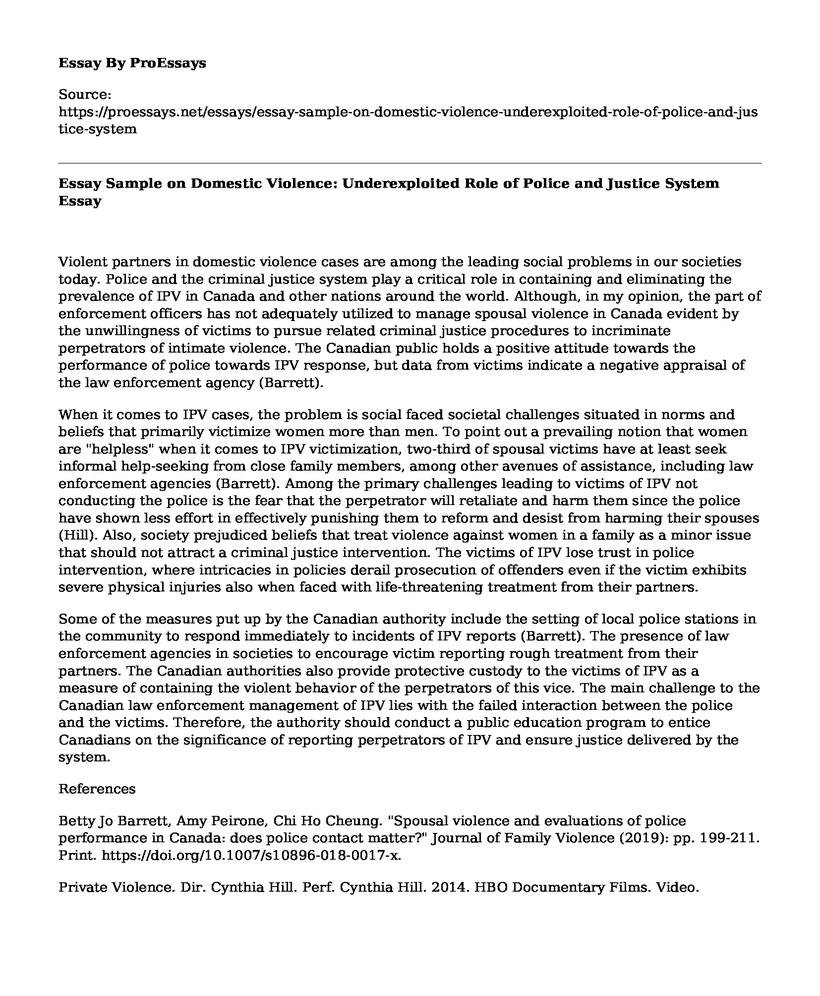Violent partners in domestic violence cases are among the leading social problems in our societies today. Police and the criminal justice system play a critical role in containing and eliminating the prevalence of IPV in Canada and other nations around the world. Although, in my opinion, the part of enforcement officers has not adequately utilized to manage spousal violence in Canada evident by the unwillingness of victims to pursue related criminal justice procedures to incriminate perpetrators of intimate violence. The Canadian public holds a positive attitude towards the performance of police towards IPV response, but data from victims indicate a negative appraisal of the law enforcement agency (Barrett).
When it comes to IPV cases, the problem is social faced societal challenges situated in norms and beliefs that primarily victimize women more than men. To point out a prevailing notion that women are "helpless" when it comes to IPV victimization, two-third of spousal victims have at least seek informal help-seeking from close family members, among other avenues of assistance, including law enforcement agencies (Barrett). Among the primary challenges leading to victims of IPV not conducting the police is the fear that the perpetrator will retaliate and harm them since the police have shown less effort in effectively punishing them to reform and desist from harming their spouses (Hill). Also, society prejudiced beliefs that treat violence against women in a family as a minor issue that should not attract a criminal justice intervention. The victims of IPV lose trust in police intervention, where intricacies in policies derail prosecution of offenders even if the victim exhibits severe physical injuries also when faced with life-threatening treatment from their partners.
Some of the measures put up by the Canadian authority include the setting of local police stations in the community to respond immediately to incidents of IPV reports (Barrett). The presence of law enforcement agencies in societies to encourage victim reporting rough treatment from their partners. The Canadian authorities also provide protective custody to the victims of IPV as a measure of containing the violent behavior of the perpetrators of this vice. The main challenge to the Canadian law enforcement management of IPV lies with the failed interaction between the police and the victims. Therefore, the authority should conduct a public education program to entice Canadians on the significance of reporting perpetrators of IPV and ensure justice delivered by the system.
References
Betty Jo Barrett, Amy Peirone, Chi Ho Cheung. "Spousal violence and evaluations of police performance in Canada: does police contact matter?" Journal of Family Violence (2019): pp. 199-211. Print. https://doi.org/10.1007/s10896-018-0017-x.
Private Violence. Dir. Cynthia Hill. Perf. Cynthia Hill. 2014. HBO Documentary Films. Video.
Cite this page
Essay Sample on Domestic Violence: Underexploited Role of Police and Justice System. (2023, Apr 23). Retrieved from https://proessays.net/essays/essay-sample-on-domestic-violence-underexploited-role-of-police-and-justice-system
If you are the original author of this essay and no longer wish to have it published on the ProEssays website, please click below to request its removal:
- Effects of Alcohol on Academic Performance Among College Students Paper Example
- Essay Example on White Privilege in America
- UN Outlines Human Rights For Health Care of Offenders - Essay Sample
- Essay Sample on Propaganda vs. Public Relations: Comparing Definitions & Interpretations
- Essay Example on Sojourner Truth: The Pioneer of Women's Rights
- Terrorism's Impact on Nigeria: Boko Haram and Beyond - Essay Sample
- "The New Colossus": A Poem of Strength, Hope, and Freedom for Immigrants - Paper Sample







